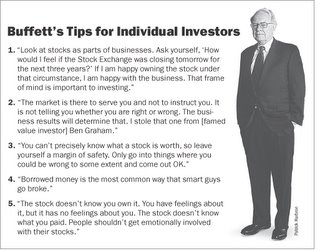Deep value investing or cigar butt investing, is buying stocks whose price is way below the various statistical measures of value of the company. Now, value can be measured by various means such as PE ratios, discounted cash flow analysis or asset values. In case of deep value investing, one is investing in stocks which are selling at a very low PE, below book value or in some cases even below cash held by the company.
This mode of analysis is a quantitative, statistics driven method where in one holds a large number of such ‘Cheap’ companies. A few positions work out, a few go down the drain and rest just stagnate doing nothing. In spite of such a mix, the overall portfolio does quite well and one is able to earn decent returns at low risk
Initial foray into high quality
My first exposure to sensible investing (reading economictimes and watching CNBC does not count in that), was when I read the book – The warren buffett way. I was completely mesmerized by this person and read all I could on him for the next few years.
I have always wondered why these stocks are called consumption stocks? are capital goods and real estate ‘un-consumption’ companies whose products no one wants to consume J ? Anyway I digress
I decided to terminate this approach in 2011 and have been exiting the positions since then. In the rest of the post I will cover my experience and learnings from this long run experiment.
The results from this portion of the portfolio (which was tracked separately) was actually quite decent. I was able to beat the market by 5-6% points during this period. At the same time, this part of the portfolio lagged the high quality portion by 6-7% over the same time period. The difference may not appear to be big, but adds up over time to a considerable difference due to the power of compounding.
Why did I quit ?
I did not quit for the obvious reason of lower returns than the rest of the portfolio. The lower return played a part, but if I compare the effort invested in building and maintaining a deep value portfolio , it is much lower than trying to identify a high quality and reasonably priced company .
If one compares, the return on time invested (versus return on capital), the balance could tilt towards the deep value style of investing.
Let me list the reasons for moving away from this style of investing
Temperament – The no.1 reason is temperament. I have realized that I do not have the temperament to invest in this fashion. I do not like to buy poorly managed, weak companies which are extremely cheap and then wait for that one spike when I can sell it off and move on to the next idea. It makes my stomach churn everytime I read the annual report of such companies and see the horrible economics of the business and miserable performance of the management.
Life is too short such for such torture
Re-investment risk- The other problem in this mode of investing is the constant need for new ideas , to replace the duds in the portfolio. This exposes one to re-investment risk (replacing one bad stock with another bad idea), especially during bull markets.
Value traps – This part of the market (deep value) is filled with stocks which can be called as value traps. These are companies which appear cheap on statistical basis, and remain so forever. The reasons vary from a bad cyclical industry to poor corporate management. In all such cases, the loss is not so much as the actual loss of money, but the opportunity loss of missing better performing ideas.
The lessons
I know some of you, have never followed this mode of investing and have always invested in quality. The problem with investing in quality is the risk of over payment, especially if the quality is just an illusion (faked as in the case of several companies in the real estate sector in 2007-2008). Anyway, that is a topic for another post.
As some has said – an expert is someone who has made the most mistakes and survived. Well, at the current rate of making mistakes, I hope to become an expert in the next 10-20 years J.

